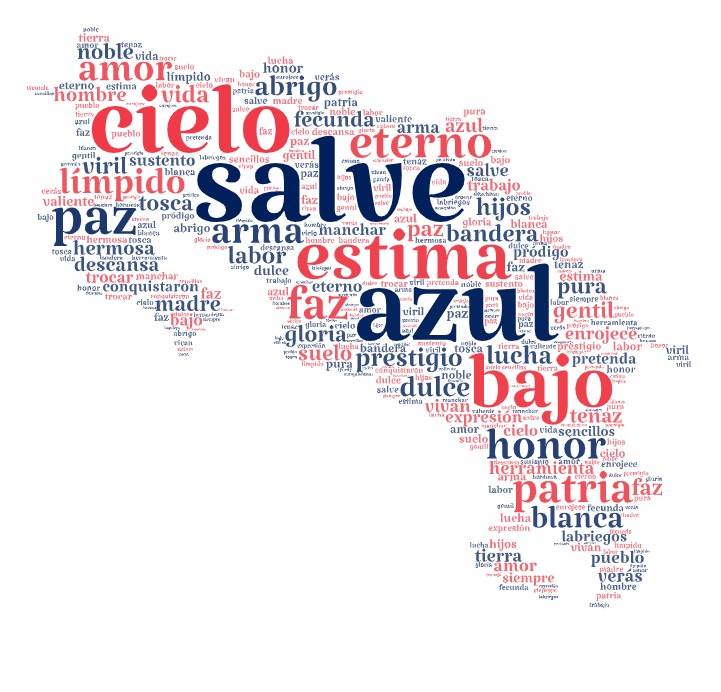
Length: 101 words
Anthem lyrics (use the arrow on the left to collapse this section):
Noble patria, tu hermosa bandera,
expresión de tu vida nos da;
bajo el límpido azul de tu cielo
blanca y pura descansa la paz.
En la lucha tenaz de fecunda labor
que enrojece del hombre la faz,
conquistaron tus hijos -labriegos sencillos-,
eterno prestigio, estima y honor.
¡Salve, oh tierra gentil!
¡Salve, oh madre de amor!
Cuando alguno pretenda tu gloria manchar,
verás a tu pueblo, valiente y viril,
la tosca herramienta en arma trocar.
¡Salve, oh patria!, tu pródigo suelo,
dulce abrigo y sustento nos da;
bajo el límpido azul de tu cielo,
¡vivan siempre el trabajo y la paz!
Historical context:
Costa Rica’s national anthem has an interesting history behind its creation. Initially, the anthem stands out from many others in that the music was composed decades before the official lyrics were written. Military musician Manuel María Gutiérrez wrote the music in 1852, in preparation for the arrival of diplomatic envoys from the United Kingdom and United States.An urban legend surrounds Gutiérrez’s composition. The story goes that Gutiérrez, who was just 22 years old at the time, refused the President’s request to write the piece, feeling that he was too inexperienced. Piqued, the President changed his means of persuasion and threw Gutiérrez in jail to think more deeply about the matter. Chastened, Gutiérrez relented and composed the song in just one day.
Bad news for fans of poetic license—this story is false. Gutiérrez did consult a friend, a French military officer, who gave him advice and moral support, but he was never imprisoned.
The story does, however, bear an uncanny similarity to the myth surrounding the creation of the lyrics to Mexico’s national anthem! According to that tale, the author, Francisco González Bocanegra, doubted his anthem-writing abilities and hesitated to throw his hat into the ring—until his girlfriend locked him in a room, telling him that she would not set him free until he finished the pieces. Unfortunately for storytellers (but fortunately for Bocanegra, perhaps), this apocryphal episode lacks any supporting evidence.
Perhaps there is something in the human psyche that enjoys a good lock-them-up-until-they-realize-their-true-talent story.
The song was played without lyrics as an unofficial anthem for many years. In the waning decades of the nineteenth century, multiple proposals for accompanying lyrics were made, but none took root until 1903, when a national competition was held. José María Zeledón Brenes, writing under the pseudonym El Labrador, took the prize with verses less martial than those of many other anthems in the Spanish-speaking world. They focus on farming and peace (“labriegos sencillos”) instead of more warlike songs.
Even after the competition, however, almost a half-century passed until the song was made official in 1949.
Performance: